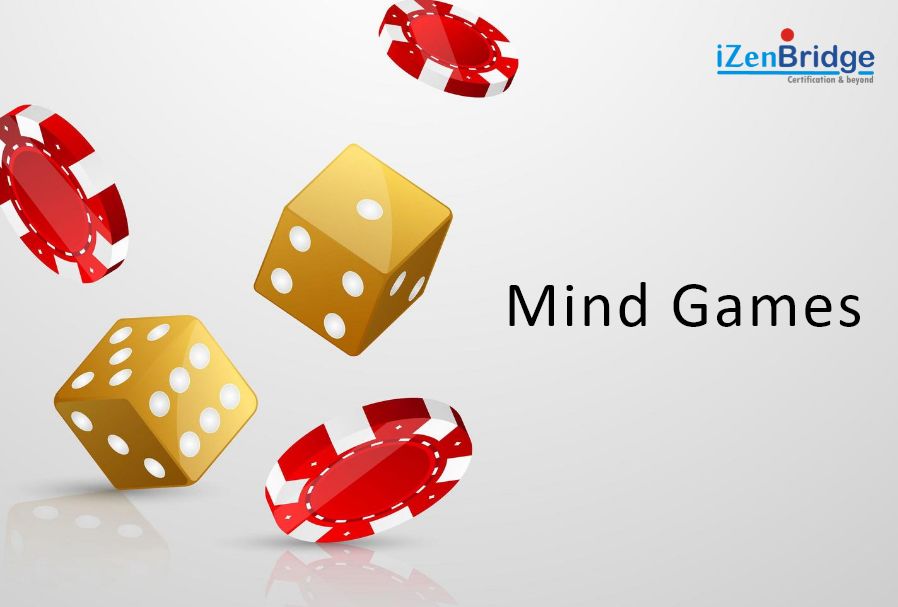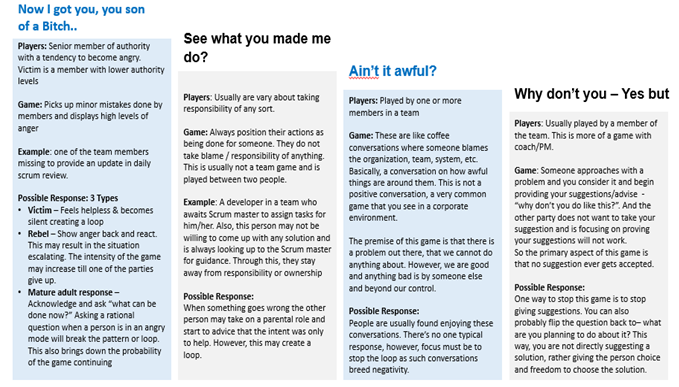

Corporate Mind Games have become an important topic of research and consideration in today’s dynamic world. More and more organizations, particularly the multinationals are investing heavily to understand the behavior of employees and teams. Why is this so important?
This is because, mind games create certain patterns of behavior that people get trapped into, which may influence their productivity performance as an individual and as a team member. It is critical for everyone to gain awareness into such mind games in order to improve collaboration.
This blog provides a snippet from one of my recent webinars of “Team Coaching with Awareness of Mind Games”
Why is awareness about Mind Games Important?
Most of us as Scrum Masters and Project Managers (PM) strive to develop a self-managed team. This helps you as an agile coach, PM or scrum master by making your teams aware of what is happening during interactions, thereby enabling them to respond in the most suitable way. Most importantly, this will make the team aware of patterns and in helping them convert their negative patterns into more productive and positive patterns.
Evolving concept of team coaching
The foundation for awareness towards mind games is to refresh our understanding of teams. The traditional view of teams is that it is a collection of individuals. In order to improve the team’s performance, one needs to improve the individual team members’ performance. We have been following this theory and most of the coaching efforts of PMs and Scrum masters is focused on individual members of the team. However, this theory is evolving where teams are no more mere collection of individuals, it is regarded as a “Whole System”.This means that when two individuals interact, their thoughts & actions influence each other and their combined behavior emerges from their influence on each other.
Mind Games: Understanding the Patterns of Interaction
The details on Mind Games that I have explained in my webinar and consecutively in this blog is from a book “Games People Play”, which is on the Psychology of human relationships, written by Eric Berne. These are powerful psychological concepts that would enable you to improve team coaching.
As a scrum master or PM, you may notice that many a times you know this is going to happen. ie. When there is an issue, this is how my team is going to behave. You can see it only when you have the awareness& you may wonder why this is happening.
This can be well understood you understand the hidden transactions – what people say Vs what they mean. Many things happen based on the ulterior motives that are not prominent in conversations & may create a loop of events that repeat itself or never ends.
This happens as our believes influences our day today behaviors – Reality is based on our perception of truth. This is when patterns emerge as people continue to perceive in a certain way resulting in repetitiveness in behavior.
How do we create Patterns / Games?
An example – When we enter a room, we observe what’s happening both the data and experience. There could be millions of data, however, the mind has a limit. Hence, the mind filters data from what it observes and creates a sub-set. To this sub-set, the mind typically adds meaning by including its own thinking, perceptions and interpretation. Then we derive a conclusion based on this. Subsequently a belief is developed based on the conclusion. Once a belief is created, the mind goes back to the original observations and picks additional data points to support the new belief. Now, the mind has developed its bias!
When there is a transaction going on between two people, both will have their believes and will also see the transactions going on. This belief + transactions create patterns that live for long – creating a Game.
Let’s Explore a Few Popular Ming Games:

So what do you do?
The best way to tackle these games is by gaining awareness that these games are being played, helping the teams develop awareness about these games and strategizing ways to break the patterns and loops. This will help in preventing the games being played again, create positive patterns that improve team collaboration and productivity.
This is just a snippet from my webinar and I hope this has provided the link between understanding mind games and improving team collaboration. I encourage you to listen to my webinar that details the mind games concept, various types of games being played and Karpman’s triangle or drama triangle. In the webinar, you will also come across interesting questions and answers around possible responses to common games we come across in our teams.
I am eager to know your views, comments and experiences on this topic.
No Trainings found